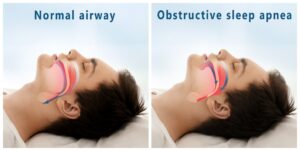 Obstructive sleep apnea (OSA) causes frequent breathing disruptions from an obstruction in the upper airway. It’s caused by the tongue or soft tissues in the back of the mouth collapsing and blocking the airway. OSA can have potentially life-threatening complications with no treatment. Here are 6 things that can make sleep apnea worse.
Obstructive sleep apnea (OSA) causes frequent breathing disruptions from an obstruction in the upper airway. It’s caused by the tongue or soft tissues in the back of the mouth collapsing and blocking the airway. OSA can have potentially life-threatening complications with no treatment. Here are 6 things that can make sleep apnea worse.
1. Weight Gain
Body weight contributes to obstructive sleep apnea. In fact, 70% of sleep apnea sufferers are obese. Obesity increases fat deposits around your neck, which adds to its circumference and additional pressure on your airway. Excessive weight also raises your risk of heart disease, high blood pressure, and diabetes, which are also linked to OSA.
According to healthcare professionals, losing 10-15% of your weight can reduce the severity of OSA by 50%. A healthy diet and active lifestyle can help you shed unwanted weight gain.
2. Certain Medications
Some medications are known to worsen sleep apnea symptoms because they relax the muscles in your throat, including:
- Muscle Relaxants
- Benzodiazepines
- Pain Killers
- Sleep Aids
Never stop taking any medications without discussing it with your physician.
3. Sleep Position
Sleeping on your back is the worst position for people with sleep apnea. It puts extra weight and pressure on your airway. It can also cause your tongue to fall back towards your throat, creating an obstruction. It’s best to sleep on your side to keep your airway open.
4. Alcohol
Alcohol may help you doze off quickly, but it can cause serious complications for people with OSA. Alcohol relaxes your muscles, which can make your tongue or soft tissues in your throat block your airway. If you can’t resist an alcoholic beverage, never consume it within a few hours of going to bed.
5. Smoking
Smoking is linked to many breathing conditions, including sleep apnea. Smoke irritates your upper airway, throat, tongue, and soft palate. The irritation can cause inflammation, narrowing your air passage. It’s best to quit smoking to breathe easier while promoting your overall wellness.
6. No Treatment
Sleep apnea will not go away on its own. You can develop serious health issues without any intervention. You have multiple options to treat sleep apnea, including:
- CPAP: A machine delivers air through a mask worn over the mouth or nose to prevent breathing disruptions.
- Oral Appliance: A custom-fit device positions your jaw to keep your tongue and soft tissues from blocking your airway.
Better nights are possible with a healthy lifestyle and sleep apnea therapy. Your sleep specialist will create the strategy you need to breathe easier for a good night’s rest.
About Dr. Glenn Thompson
Dr. Thompson achieved his dental degree from the Tufts University School of Dental Medicine and has regularly continued his education in many specialties, including sleep apnea treatment. He can provide diagnosis and treatment for sleep apnea using the latest solutions, like an oral appliance. Request an appointment through his website or call (702) 903-1649.